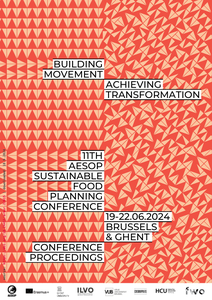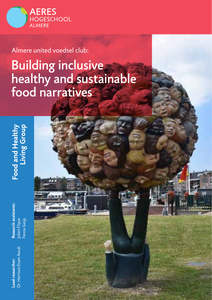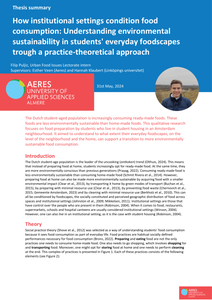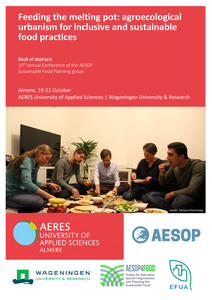The transition towards a sustainable and healthy food system is one of the major sustainability challenges of today, next to the energy transition and the transition from a linear to circular economy. This paper provides a timely and evidence-based contribution to better understand the complex processes of institutional change and transformative social-ecological innovation that takes place in the food transition, through a case study of an open innovation and food transition network in The Netherlands, the South-Holland Food Family (Zuid-Hollandse Voedselfamilie). This network is supported by the provincial government and many partners, with the ambition to realize more sustainable agricultural and food chains, offering healthy, sustainable and affordable food for everyone in the Province of South-Holland in five to ten years from now. This ambition cannot be achieved through optimising the current food system. A transition is needed – a fundamental change of the food system’s structure, culture and practice. The Province has adopted a transition approach in its 2016 Innovation Agenda for Sustainable Agriculture. This paper provides an institutional analysis of how the transition approach has been established and developed in practice. Our main research question is what interventions and actions have shaped the transition approach and how does the dynamic interplay between actors and institutional structures influence institutional change, by analysing a series of closely related action situations and their context, looking at 'structure' and 'agency', and at the output-outcomes-impact of these action situations. For this purpose, we use the Transformative Social-Ecological Innovation (TSEI)-framework to study the dynamic interplay between actors and institutional structures influencing institutional change. The example of TSEI-framework application in this paper shows when and how local agents change the institutional context itself, which provides relevant insights on institutional work and the mutually constitutive nature of structure and agency. Above institutional analysis also shows the pivotal role of a number of actors, such as network facilitators and provincial minister, and their capability and skills to combine formal and informal institutional environments and logics and mobilize resources, thereby legitimizing and supporting the change effort. The results are indicative of the importance of institutional structures as both facilitating (i.e., the province’s policies) and limiting (e.g. land ownership) transition dynamics.
DOCUMENT

Citizens living in food poverty can easily get caught up in a vicious cycle. Socio-economically disadvantaged people often rely on food assistance and are more likely to suffer from diseases caused by unhealthy diets, such as diabetes. They may also experience isolation and lack social networks, as they do not have the financial means to participate in social life. Moreover, this group is often overlooked in decision-making processes regarding healthy and sustainable food environments. To create equitable food environments in urban areas, it is crucial to incorporate the everyday challenges and needs of socioeconomically disadvantaged people. In our collaborative research, we explore the needs of socioeconomically disadvantaged people regarding a healthy and sustainable diet in Switzerland and the Netherlands. The aim is also to develop, in a participatory way, ideas on how to create more socially just and inclusive food environments.Keywords: food poverty, food environments, social participation, participatory action research
DOCUMENT

More and more people worldwide live in urban areas, and these areas face many problems, of which a sustainable food provision is one. In this paper we aim to show that a transition towards more sustainable, regionally organized food systems strongly contributes to green, livable cities. The article describes a case study in the Dutch region of Arnhem–Nijmegen. Partners of a network on sustainable food in this region were interviewed on how they expect the food system to develop, and in design studies possible futures are explored. Both the interviews and the designs give support to the idea that indeed sustainable food systems can be developed to contribute to green livable cities. They show that the quality and meaning of existing green areas can be raised; new areas can be added to a public green system, and connections with green surroundings are enforced. They also show that inhabitants or consumers can be stimulated to become so called food citizens, highlighting that the relation of food systems and livable cities is a very close one.
DOCUMENT

The aim was to study the needs, opportunities and effects of citizen engagement in the urban food system transition. This addresses the issue of - ‘how’, ‘in what ways’ and ‘through what methods’ - citizens can be engaged in the developments towards a more sustainable and healthy regional food system. The research project sought to investigate the roles citizen engagement can take in the transformation of the urban food environment towards healthier and sustainable food consumption patterns. The study covers desired food futures; food discourse; the message our bodies convey about our eating habits; the effect of Covid-19 on food pattern transformations; the term 'organic' in relation to food; mass media as a source of information about food.
DOCUMENT

Making food packaging more sustainable is a complex process. Research has shown that specific knowledge is needed to support packaging developers to holistically improve the sustainability of packaging. Within this study we aim to provide insights in the various tradeoffs designers face with the aim to provide insights for future sustainable food packaging (re)design endeavors. The study consists of analyzing and coding 19 reports in which bachelor students worked on assignments ranging from (1) analyzing the supply chain of a food product-packaging combination to (2) redesigning a specific food packaging. We identified 6 tradeoffs: (1) Perceived Sustainability vs. Achieved Sustainability, (2) Food Waste vs. Sustainability, (3) Branding vs. Sustainability, (4) Product Visibility vs. Sustainability, (5) Costs vs. Sustainability, and (6) Use Convenience vs Sustainability. We compared the six tradeoffs with literature. Two tradeoffs can be seen as additional to topics mentioned within literature, namely product visibility and use convenience. In addition, while preventing food waste is mentioned as an important functionality of food packaging, this functionality seems to be underexposed within practice.
MULTIFILE

This study proposes a systematic value chain approach to helping businesses identify and eliminate inefficiencies. The authors have developed a robust framework, which food-sector entrepreneurs can use to increase profitability of an existing business or to create new profitable opportunities. The value chain approach provides win-win opportunities for players within the value chain. To test the robustness of the framework, the authors use food waste as an example of a critical inefficiency and apply it to two different food sector business cases, each operating in diverse conditions. Because the suggested framework addresses the core elements and parameters for the existence and competitiveness of a business, the model can be adapted to other sectors.
DOCUMENT

The Dutch student-aged population is increasingly consuming ready-made foods. These foods are less environmentally sustainable than home-made foods. This qualitative research focuses on food preparation by students who live in student housing in an Amsterdam neighbourhood. It aimed to understand to what extent their everyday foodscapes, on the level of the neighborhood and the home, can support a transition to more environmentally sustainable food consumption. This is a thesis summary.
DOCUMENT

Food and the city has never been a more urgent theme than today, and The European Union’s priority to commit to innovation in this field will certainly enhance its economic and external strength and improve its competitive position in the world of food and life sciences. Europea Netherlands held a seminar on this topic in May 2016, during the Dutch EU presidency.To be part of this international endeavour, the Netherlands need to strengthen the digital market, support innovation in the internal market, boost domestic policy reforms, and embed their knowledge and skills in a European society that challenges itself and continues to innovate. The Netherlands is a global player in the agro, food and horticultural sector and a major player in the export market of agricultural products. This sector is one of its main economic pillars. New knowledge is being developed as we speak, which is also an export product in high demand, providing sizeable employment. This is only possible because the sector is innovative and remains up-to-date. The peri-urban areas in the Netherlands (both urban and rural areas) are characterized by high population density. This necessitates thinking about manufacturing, food, logistics and water management(circular economy). Land-based education and life sciences in the Netherlands may appear to be specific, yet it is broad too: the primary sectors are included, as well as the manufacturing businesses and services associated with it. Participants learn to work in an innovative sector in a society in transition, bringing together multiple disciplines (cross-overs) and stakeholders. This education is practical and has a strong connection to the industry. During the Europea seminar five professorships, installed by the ministry of Economic Affairs, focused on transitions in the agro and food sector. The five professorships are posted at the Dutch Agricultural Universities of applied sciences, including teacher education for sustainable connected learning and development for professional education and business communities.
DOCUMENT

Food and the city has never been a more urgent theme than today, and The European Union’s priority to commit to innovation in this field will certainly enhance its economic and external strength and improve its competitive position in the world of food and life sciences. Europea Netherlands held a seminar on this topic in May 2016, during the Dutch EU presidency.To be part of this international endeavour, the Netherlands need to strengthen the digital market, support innovation in the internal market, boost domestic policy reforms, and embed their knowledge and skills in a European society that challenges itself and continues to innovate. The Netherlands is a global player in the agro, food and horticultural sector and a major player in the export market of agricultural products. This sector is one of its main economic pillars. New knowledge is being developed as we speak, which is also an export product in high demand, providing sizeable employment. This is only possible because the sector is innovative and remains up-to-date. The peri-urban areas in the Netherlands (both urban and rural areas) are characterized by high population density. This necessitates thinking about manufacturing, food, logistics and water management(circular economy). Land-based education and life sciences in the Netherlands may appear to be specific, yet it is broad too: the primary sectors are included, as well as the manufacturing businesses and services associated with it. Participants learn to work in an innovative sector in a society in transition, bringing together multiple disciplines (cross-overs) and stakeholders. This education is practical and has a strong connection to the industry. During the Europea seminar five professorships, installed by the ministry of Economic Affairs, focused on transitions in the agro and food sector. The five professorships are posted at the Dutch Agricultural Universities of applied sciences, including teacher education for sustainable connected learning and development for professional education and business communities.
DOCUMENT

Food and the city has never been a more urgent theme than today, and The European Union’s priority to commit to innovation in this field will certainly enhance its economic and external strength and improve its competitive position in the world of food and life sciences. Europea Netherlands held a seminar on this topic in May 2016, during the Dutch EU presidency.To be part of this international endeavour, the Netherlands need to strengthen the digital market, support innovation in the internal market, boost domestic policy reforms, and embed their knowledge and skills in a European society that challenges itself and continues to innovate. The Netherlands is a global player in the agro, food and horticultural sector and a major player in the export market of agricultural products. This sector is one of its main economic pillars. New knowledge is being developed as we speak, which is also an export product in high demand, providing sizeable employment. This is only possible because the sector is innovative and remains up-to-date. The peri-urban areas in the Netherlands (both urban and rural areas) are characterized by high population density. This necessitates thinking about manufacturing, food, logistics and water management(circular economy). Land-based education and life sciences in the Netherlands may appear to be specific, yet it is broad too: the primary sectors are included, as well as the manufacturing businesses and services associated with it. Participants learn to work in an innovative sector in a society in transition, bringing together multiple disciplines (cross-overs) and stakeholders. This education is practical and has a strong connection to the industry. During the Europea seminar five professorships, installed by the ministry of Economic Affairs, focused on transitions in the agro and food sector. The five professorships are posted at the Dutch Agricultural Universities of applied sciences, including teacher education for sustainable connected learning and development for professional education and business communities.
DOCUMENT

This book contains the abstracts to the sessions presented at the AESOP Sustainable Food Planning conference in 2022. The conference was made up of four tracks: social inclusion; urban agriculture; urban planning, design and development; food governance.
DOCUMENT
